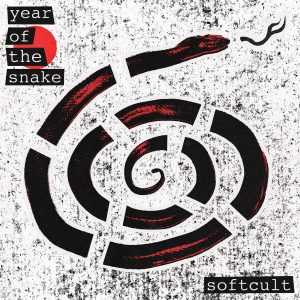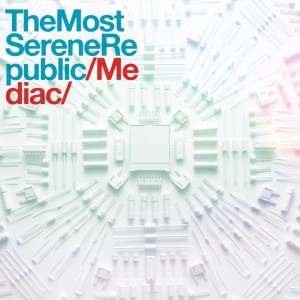Cult following

Canadian twins Mercedes and Phoenix Arn-Horn have flushed punk-spiked KoolAid from precursive project Courage My Love and mixed infinitely intoxicating elixirs as Softcult into Year Of The Snake, a marvelous manifesto that belies their “music for mall goths” mission statement. Striking immediately, lethal lead single “BWBB” and “Spit It Out” meld the zeal of female forbearers Veruca Salt with Muse overtones underneath socially conscious soliloquies against misogyny’s venom. Ear-splitting outro “Uzumaki” evokes visions of Eisley rocking Klon clones and airy absinthes “Perfect Blue,” “Gaslight” and “House Of Mirrors” augment sensitive sister EP Year Of The Rat‘s efficacy, masterfully modulating an auditory asp too sophisticated to include on Hot Topic playlists.
Humdrum
Iceberg, right ahead!
Space rock honchos Hum dropped a titanic anchor last month titled Inlet. Occasionally teased but never verified, the band’s first voyage since 1998’s watershed Downward Is Heavenward is being hailed as their crowning achievement and “most compelling album ever.” This manner of misplaced mania regarding revelatory reunions persists with indie music’s oceans drying up and fans’ thirsts increasingly unquenched. At best, Hum half refill the reservoir.

The fact that a Hum release drifted silently into Internet ports without publicity is telling. Inlet doesn’t navigate new nautical miles. It undeniably sounds like Hum. They’ve never blared their fuzz foghorns louder, and the typhoon of atmospherics drowns even the closest cartographic challengers. But Hum focus too much on harpooning that whale, neglecting a gaping hole in the record’s hull.
The uncharted choral riff territory DIH and You’d Prefer An Astronaut discovered became the Dead Sea Scrolls of guitar tablature. Inlet unearths no such treasure. Captain Matt Talbott and first mate Tim Lash don’t dive as deep or cast the nets as wide, shoving off untethered to circuitous structural concepts and effectively throwing bassist Jeff Dimpsey and drummer Bryan St. Pere overboard. It’s a perplexing portolan considering the strong rip currents amidst the murk of moorings “In The Den,” “Cloud City,” “Folding,” and “Waves.” Their collective buoyancy ensures the album stays afloat when it runs aground on its other angling atolls.

Inlet would be a dreamboat debut for novice mariners. Hum, however, are old hands at sailing sonic seas. They’re just not all on deck here.
Pagan holiday

A refreshing respite in these locked down times, Belfast’s New Pagans dispense an alternative antidote for self-isolation with Glacial Erratic. Garage rock getaways “Bloody Soil” and “It’s Darker” inoculate the vocal vaccine of lead singer Lyndsey McDougall as she applies urgent angst to guitarist Cahir O’Doherty’s sinewy solo outbreaks. “Lily Yeats” and “I Could Die” double the dose of post-punk penicillin, “Admire” adeptly flattens the recording’s cranked up curve and copacetic cure-all “Charlie has the face of a saint” further distances the band from insipid indie herds. It’s a contagious consideration for “Album of the Year.”
Drifter
 One is a lonely number. Nobody knows it better than Danish multi-instrumentalist savant Jeppe Dengsø, who makes coping cathartic on You Drift Away From Me, his first full-length under the moniker Moon Loves Honey. Chronicling insecurities about the uncertain fate of a once close friendship, Dengsø digs deep inside this despondence and dredges several therapeutic gems. “Should’ve Waited,” “Before I Crash,” “Lonely Day” and the title track can cheer up dour dispositions, and display emotional and musical temperament progression from MLH’s initial inkblot (2016’s Apart EP). The other admissions aren’t particularly riveting rorschachs, stifling a potential breakthrough that could’ve materialized had ideal icebreakers “Cages” and “Not Only in My Dreams” taken their place in the album’s hierarchy of needs.
One is a lonely number. Nobody knows it better than Danish multi-instrumentalist savant Jeppe Dengsø, who makes coping cathartic on You Drift Away From Me, his first full-length under the moniker Moon Loves Honey. Chronicling insecurities about the uncertain fate of a once close friendship, Dengsø digs deep inside this despondence and dredges several therapeutic gems. “Should’ve Waited,” “Before I Crash,” “Lonely Day” and the title track can cheer up dour dispositions, and display emotional and musical temperament progression from MLH’s initial inkblot (2016’s Apart EP). The other admissions aren’t particularly riveting rorschachs, stifling a potential breakthrough that could’ve materialized had ideal icebreakers “Cages” and “Not Only in My Dreams” taken their place in the album’s hierarchy of needs.
Ghost writer
 Emo emissary Jeremy Enigk conjures the spirit of projects past on 2017’s Ghosts, a songwriting séance that deserves a plot between the eternal flames of The Fire Theft and Sunny Day Real Estate‘s The Rising Tide. His voice is as harrowing as ever, humbly hovering over each track with an ethereal essence exhumed from those career-defining caskets. But several haunting specters (“Amazing Worlds,” “Victory,” “Light and Shadow”) engrave a more intimate, transparent aura for Enigk that until now has lurked in the background. This vulnerability reprises through “Sacred Fire,” “Onaroll,” “Ancient Road” and the penultimate “I Am Revolution,” reverent reveries revealing both his innermost struggles and the power of personal redemption to overcome them. Another spine-tingling Enigk apparition, Ghosts is one of the most significant artistic reincarnations in recent memory.
Emo emissary Jeremy Enigk conjures the spirit of projects past on 2017’s Ghosts, a songwriting séance that deserves a plot between the eternal flames of The Fire Theft and Sunny Day Real Estate‘s The Rising Tide. His voice is as harrowing as ever, humbly hovering over each track with an ethereal essence exhumed from those career-defining caskets. But several haunting specters (“Amazing Worlds,” “Victory,” “Light and Shadow”) engrave a more intimate, transparent aura for Enigk that until now has lurked in the background. This vulnerability reprises through “Sacred Fire,” “Onaroll,” “Ancient Road” and the penultimate “I Am Revolution,” reverent reveries revealing both his innermost struggles and the power of personal redemption to overcome them. Another spine-tingling Enigk apparition, Ghosts is one of the most significant artistic reincarnations in recent memory.
Shimmer sham
All that glitters is not a mirror ball trophy.
Keeping with what has become biennial ballyhoo, And So I Watch You From Afar sashayed into the studio last year to choreograph another record. After nearly scoring a perfect 10 for 2015 routine Heirs, the band busts a few new moves and revives some older ones in a toe-tapping freestyle guaranteed to steal the lead atop many “Best of 2017” lists. Where ASIWYFA get tripped up, though, isn’t execution. The fluidity that defined past pirouettes peters out through a series of faceplants the remainder of their rowdy rumba cannot overcome.

A jumble of jarring jigs, The Endless Shimmering flails ferociously about the floor as its limbs lurch independently from A-side to B-side – albeit with enough fancy footwork to impress Fred Astaire. Guitarists Rory Friers and Niall Kennedy cut a mean rug on torrid tango “Mullally,” which spots promenade positions similar to “Mend and Make Safe” and allows bassist Johnny Adger a rare moment in the limelight. “All I Need is Space,” “I’ll Share a Life” and the title track are finicky fox trots full of festive flourishes and telemark tricks, bolstering the center point for an offbeat ballet bereft of balance.
The opening pattern stumbles awkwardly, pushing aside drummer Chris Wee’s terrific thunder claps during the first half of “Three Triangles” in favor of recycled Gangs quicksteps. “Dying Giants” kills its own figure by replacing its high-brow hook, while “Terrors of Pleasure” would be more pleasing without the middle’s discombobulated dip. “A Slow Unfolding of Wings” is an abrupt heel turn, slowing to a whimsical waltz that’s so skillfully syncopated, it’s almost hypnotic… and the group’s most affective adagio since “All Hail Bright Futures.”

Marred by misaligned motions, The Endless Shimmering never slots a cohesive connection. ASIWYFA have always swayed to their own beat, but this dance is uncharacteristically unrefined.
MVPs
With Enemies like these, who needs friends?
Ireland’s indomitable math players are ending a nine-year stint in the primes of their careers. More importantly, they’ll be suiting up one final time (December 18 at Dublin’s Vicar Street) as co-captains, not rivals. In a September letter announcing that their third full-length, Valuables, would be their last release, indie’s jazziest jocks revealed a locker room in disarray. There were disagreements about strategy. Everybody wanted to coach. The internal competition became fierce, driving a wedge between them even as they thoroughly routed road venues on 2016’s spring tour.
But pain soon gave way to gain. After deciding to retire for good, Enemies huddled their talent and pushed another all-star album across the goal line.

This LP doesn’t feature the high-flying offense of Embark, Embrace or the brute physicality of We’ve Been Talking; rather, Valuables scores early and often by demonstrating pinpoint precision and an elevated efficiency that rarely wastes possessions. Guitarists Lewis Jackson and Eoin Whitfield double cover their distinctive dexterity, diagramming deft dump-offs to move the chains. Lead blocker “itsallwaves” may be the most athletic anthem in Enemies’ annuls and opens gaping holes for additional blitzes of bravado. “Play Fire” and “For Karla” audible to agile pop cuts, completing bassist Mark O’Brien’s conversion into a dual threat. His vibrant vocal passes punctuate the win for a squad usually content to let its amps carry the load.

The game ball, however, goes to third-year recruit Micheál Quinn. Now the market’s best free agent drummer, Quinn maneuvers all over the field with ridiculous rudiment flexibility. He tenaciously tackles demanding drives (“Leaves,” “Phoenix Lights,” “Houran”) but dials back the pressure when defending lulls in the action (“Glow,” “Don’t Go”). Whether roaming the middle or tussling in the trenches, Quinn is subtle nuance on steroids during a standout performance.
Enemies are a team for the ages. Regardless of the marks any future champions set, Valuables is a record that will never be duplicated.
Melting pot
A remixed recipe has been added to the indie stew.
Melt is a new selection off the emo entree menu of reputed restaurant Topshelf. The New Jersey foursome roasts racks of reverb revolved around the genre’s organic ingredients, cooking a catchy cuisine peppered with spicy hooks.

Barely a three-course meal (10 songs ingested in 28 minutes), the band’s first album leaves both a sweet aftertaste and an empty stomach. Riffer serves sizzling appetizers – “Rewind,” “Out of Line,” “Rollaway,” the title track – but the leftovers are a bland buffet. Dishes “There You Go”, “C-Town,” “Saber” and “Stroke” go light on flambé and flavor, making them tougher chews.
Though Riffer isn’t soup of the day, Melt has concocted a palatable palette. A little extra seasoning and it will be mouthwatering.
Honeymoon
It’s love at first sound for the latest indie heartthrob.
All aflutter with intimate interludes, Moon Loves Honey endear themselves to paramours longing to rekindle euphonic ardor. The Aarhus quartet call to mind credible crushes Dråpe and Star Horse, but their flirtatious fetish (termed “dream rock”) is more attractive and accessible.

Especially enchanting on the group’s debut is the vocal foreplay between guitarist Jeppe Dengsø and keyboardist Stine Drejer, who are a match made in harmony heaven. The tastiest of these titillating trysts – the mesmerizing “My Friends” – loops linear lyrics through virile verses and a coital coda, dowering Denmark its most seductive dalliance since Mew‘s “Comforting Sounds.” The rest of the EP runs an orgasmic gamut of frolicking and forlorn fugues.
Moon Loves Honey isn’t just a one-night stand. Walk Apart down the aisle and put a ring on it.
Bewilderness
Explosions in the Sky have gone from taking care to not caring.
Instrumental rock’s biggest name became this year’s most recent revenant, wandering back after a hiatus in the Hollywood hinterlands. They bring a lot of glitz and glamour – but not much else – to bear on their first release since 2011, which is as unrecognizable as a mauled trapper; moreover, the injuries were self-inflicted.
Admittedly dissatisfied with being labeled a “montage” band (and what better way to challenge that perception than spending three years scoring films), EITS responded by turning neurotically nomadic. Other contemporaries have ventured out on similar-sounding, atypical treks (e.g., Saxon Shore‘s Luck Will Not Save Us From a Jackpot of Nothing; Unwed Sailor‘s Little Wars), so EITS aren’t treading new ground. But those exploratory exploits didn’t exclusively exclude previous paths. The Wilderness encompasses the ecology of an EITS record – except that it doesn’t know where it’s going and takes too long to get there.

EITS hike through a hubristic headwind of ambient electronics, stopping some songs dead in their tracks and preventing the music’s natural bluster from blowing them forward. “Wilderness,” “Colors in Space,” “Landing Cliffs,” “The Ecstatics,” and “Logic of a Dream” get hopelessly lost, beleaguered by banal beats and deprived of edible intensity until twilight, when only small scraps of uncured melodic meat are left to ration. Even on climbs where EITS encounter obvious orientation (“Tangle Formations,” “Disintegration Anxiety,” “Infinite Orbit”), they walk in circles. There’s an abundance of sustainable soil at every encampment that’s never saturated. The earth dries up so quickly, it becomes a cold, dead place.

EITS are a feral force of indie nature, one The Wilderness hinders instead of harnessing. The album is vast in ethereal expanse yet equally empty as an evocative ecosystem that can’t see the forest for the trees.
Blastoff
Not since Sputnik has a single launch been so stratospheric.
The country that began the Space Race is instigating more innovation as self-described “thunder pop” purveyors Pinkshinyultrablast rocket into 2016 with a resounding roar. Its tanks full of phenomenal fretboarding fuel, the Russian quintet’s second LP Grandfeathered transports one of the heaviest payloads ever recorded and propels them on an astounding ascent towards indie stardom.

2015 test flight Everything Else Matters was a captivating capsule, but PSUB have improved those schematics and fabricated a stronger shuttle engineered for maximum weight. Mission commander Roman Parinov (guitar) and co-pilots Sergey (drums), Igor Simkin (bass) and Rustam Izmailov (keyboards) transfer pulverizing propulsion to boosters “Glow Vastly” and “I Catch You Napping,” lifting PSUB off the pad at warp speed. Main thruster “Kiddy Pool Dreams” – which powered past all possible parallels to become last year’s best song – shatters the sound barrier and combusts in explosive momentum from the mass of Parinov’s Hum-ish intro and Simkin’s subtle impulse shifts.

Instead of merely gliding upon reentry, PSUB keep the engines locked on high throttle. Singer Lyubov Soloveva, exhaling lilting vocals inside the entire pod, finds extra room to breathe during the landing sequence. Her steady walk above “The Cherry Pit” is tethered to an enormous exhaust of g-force guitars that could burn through the ozone. “Mölkky” aggressively accelerates the approach, and the cleaner carbons of “Comet Marbles” and the title track form hifi heat shields, ensuring a stable touchdown.
Grandfeathered traverses an untouchable trajectory. For Pinkshinyultrablast, the sky’s the limit.
Happy medium
The Most Serene Republic are back on the air.
After shutting down production for five years, Canada’s premier indie broadcasters have developed a pilot that gives their signature sound a fresh twist. TMSR film Mediac in a format curiously scrapped from the …And the Ever Expanding Universe treatment, revisiting techniques beloved by avant-garde audiences. The final cut is a meandering but mostly satisfying spin-off.

Singer Adrian Jewett and writer/producer Ryan Lenssen once again assume lead roles, flanked by the usual supporting cast and, during several delightful segments, background vocalist Natalie Klett. Jewett’s dialogue drives another nowadays narrative, though less cryptic and more succinct so as to readily reach the millennial microblogger. “Ontario Morning” – an excellent episode bound for the band’s classics box set – expertly lures that target demo with a poignant and pervasive pizzaz just begging to be hashtagged. “I Haven’t Seen You Around” (staccato line flubs aside) and “Capitalist Waltz” follow the same simple script and steal many of the remaining scenes.

Not every chapter of this reboot is must-see TV. “Love Loves To Love Love” splices an Underwater Cinematographer frame to the reel without regard for theatrical continuity, “Nation Of Beds” and “Benefit Of The Doubt” are kitschy commercial filler and “Brain Etiquette” reads like a discarded Odelay beat sheet. They pan to Population retrospectives and regain proper pacing on “Failure Of Anger,” “Fingerspelling” and frenzied finale “The Feels,” whose plot fans will assuredly want continued in the next installment.
Even if it doesn’t become a ratings juggernaut, Mediac proves The Most Serene Republic still have prime time staying power.
Band of the Rising Sun
A blinding light from the Far East is breaking through the indie skyline.
Japanese musician Sourin synthesized a luminous LP in September that coalesces a kaleidoscope of sounds and bends it into an aural aurora. Each song’s short bursts (all dissipate in under four minutes) refract independently yet maintain symmetry when viewed as a single prism.

Sourin distills a spacious spectrum of styles ranging from shoegaze to electronica. His fluorescent falsetto is the constant corona, effortlessly fluctuating along the wavelengths and wistfully filling the shadows. “Koufu” and “Shunsu” shine superbly with rainbows of reverb and lustrous guitars. “Kitsunebi” and “Shunki” are brilliant pop flashes, galvanizing in their glittering gusto. The gamma of “Hiyori,” “Shu-rin,” and “Setsugetsuka” emit softer glows in a deliberate divergence to most of the album’s glaring rays.
Sourin has created a stunning solarium that gleams with gravitas. Few releases in 2015 have eclipsed it.
Heir apparent
And So I Watch You From Afar is one of indie rock’s finest monarchs. With Heirs, they raucously resume their reign.
The Irish instrumentalists’ first release in two years represents their most lavish long player to date. ASIWYFA erect a castle of cavernous calamity, enshrining audacious antiquities that pay homage to a lasting lineage. These artifacts inherit the artistry of their ancestors and even more avarice. Rory Friers and his minstrel court spare no expense adorning this acropolis in affluent acoustic accoutrements fit for a king.

ASIWYFA repose Heirs with resplendent riffs reminiscent of relics from the seminal Gangs and robe it in the effusive energy of All Hail Bright Futures. “Run Home” is the album’s crown jewel, subjugating commoners through guitar grandeur not heard since “Beautifuluniversemasterchampion.” “Redesigned a Million Times,” a less opulent overture, obtains ornate orchestration akin to “7 Billion People All Alive At Once.” Friers and Niall Kennedy synchronize their scepters solemnly for “Wasps” and “A Beacon, A Compass, An Anchor” and paint a magnificent mural of mercurial modals on the walls.
To assuage lieges leery of vested vocals, ASIWYFA imbue “These Secret Kings I Know,” “People Not Sleeping,” “Tryer, You,” “Fucking Lifer” and “Animal Ghosts” with the ambiance of 2011’s debut. But the seven-minute title track bequeaths it best, the band’s dynasty dignified by a destructive descendant unlike any in their history. Drummer Chris Wee knights its nobility, nuancing cadences and nurturing crescendos that contribute another incredible crest to an incomparable catalogue.
ASIWYFA has never ruled so royally. Heirs leaves a legacy that will be lionized for generations.
Lights brigade
A corps of past heroes has joined the present revolution.
Decorated stalwarts and frequent confederates Johnathon Ford (Unwed Sailor) and Bryce Chambers (Ester Drang) took up arms together and enlisted Native Lights in 2010, firing a two-track warning shot that sounded a clarion call for other factions to heed their advance. Ford and Chambers then quietly pulled back and sought refuge in an abandoned cattle auction house, where they marshaled a full-scale offensive. Commenced in March, the self-titled debut lays siege to a battlefield rife with toy soldiers and commissions Native Lights as a formidable force.

Native Lights charge over the hill with guns blazing. Chambers positions himself along the front line equipped to the essential pedalboard hilt, while Ford lobs an unyielding barrage of bass grenades from his familiar foxhole. They spark the album’s powder keg, “Black Wall Street,” by setting off a deluge of drop-D distortion and detailed delay designed to decimate anything in their path. This blitzkrieg draws white flags well before the final note; nevertheless, Native Lights relentlessly press the strategy forward.
“Blue Star” and “Sun Tzu,” bruising post-rock battering rams, pummel residual opposition into submission. Victory at hand, Ford and Chambers beckon survivors to pledge allegiance to their cause on “La Rosa” and “White Elephant.” The record’s two most tactically tuned turrets turn Native Lights from pillager to peacemaker and proclaim an end to hostilities in a hail of haunting harmonics and Chambers’ vigorous vocal sorties.

Having dismantled the heavy artillery, Ford and Chambers take time to savor the spoils, christening their conquered land with the invocational “Ruins” and tribalistic “Abuse Arcade.” “Stalin’s Organs” purifies the seizure as Ford leads a triumphant march to remove entrails littering the beachhead.
Native Lights are more than a reinforcement for the indie ranks. The cavalry may have decisively arrived.
Power surge
Oil may no longer be Oklahoma’s best energy source.
Shoegazers Power Pyramid are lighting up the Sooner state, overloading its music grid with an electrical storm of fuzz and feedback. Guitarists Daniel Weaver and Trey Millward threw the switch on demos in late 2012 that quickly became the dynamo for a broader songwriting current. The magnetism attracted Jennifer Lynch (bass) and Kilyn Massey (guitar) to 2013’s The God Drums, a full-length debut that lacked voltage but induced enough capacitance to make it resonate.

Last November, the band added drummer Brent Hodge, who helped ground the highly charged Insomnia EP released through Norman-based substation We Are Nice People at the beginning of this year. July’s self-titled album propagated their largest decibel output so far and phased in James Hammontree as new bass insulation.
Power Pyramid has given the indie circuit a serious jolt.
On target
Another bullseye notched on the indie dartboard.
Ambitious and ironically branded, Oakland’s The Aimless Never Miss never did in four years before temporarily checking out. They hit the mark early with a double-ring of EPs (2006’s Oh, If They Could Fly and 2007’s The Bright Side), then registered a ton 80 on their self-titled full-length in 2008. Combining previously released tracks and songs conceived for the second EP’s promotional tour, the album was flighted by frontman Jon Latimer’s intricate guitar work and pointed by incredulous lyrics that tackled topics like 9/11, World War II, and the pitfalls of modern technology.

After losing original members Rosie Steffy and Winston Goertz-Giffen, Latimer continued firing missiles. 2009’s Tran EP, featuring longtime bassist Andrew Macy and drummer Eric Kuhn, was a killer. The band’s most recent leg in 2010 – The High Dive To Lo-Fi, Volume I – saw Latimer going bust to the outer edges of TANM’s sound with past contributors (Steffy chief among them) and several guest performers from the Bay Area.
Latimer has reportedly been writing new material round the clock and finishing a re-mixed version of Tran. Both promise to be just as accurate as his prior throws.
Norse anthology
Scandinavia has a new deity whose might could dethrone Thor.
With prescient ability to harness mystical sonics, Norway’s Dråpe is bestowing empyreal music upon a mortally tone-deaf planet. The band’s omnipotence was consecrated in 2011 through the self-titled EP gifted by Ketil Myhre, Peter Rasmussen Lubiana, Lars Boquist, Eirik Kirkemyr and vocalist Hanne Olsen Solem, which reincarnated shoegaze into a maelstrom so miraculous it defies description.

The quintet – now including guitarist Even Hafnor – ascended to higher dimensions last year on Canicular Days, a transfiguration that harkens back to the early wonders performed by Danish indie gods Mew. Illuminated in all their breathtaking glory, Myhre’s transcendent tenor and Solem’s sirenic soprano soar over pristine instrumentation, manifesting the most majestic trinity this side of the afterlife.
Dråpe is simply divine.
Richter scale
Music topography fault lines can often be as unstable as the San Andreas, swallowing bands and labels into a chasm of debt, corporate influence and popular opinion. The Richter Collective, an Ireland-based epicenter, refused to succumb to those constant rumblings before forces beyond its control necessitated self-implosion in 2012.

The aftershocks of that temblor are still being felt. Instrumental transforms And So I Watch You From Afar and Enemies have ruptured normal tectonics, creating new, impassable boundaries. Stabilized by guitarist Rory Friers and drummer Chris Wee, ASIWYFA’s groundbreaking Gangs shook the indie world in 2011, and last year’s All Hail Bright Futures made just as big an impact.

Enemies touched off similar seismic events. Guitarists Eoin Whitfield and Lewis Jackson and bassist Mark O’Brien converged with the math rock mechanics of Oisin Trench on 2010’s We’ve Been Talking, which was the precursor to an immense tremor. Embark, Embrace (2013) hit harder than any of their prior releases, reverberating around the globe during tours that spanned Europe, Asia and the U.S.
Both groups’ earth-shattering live shows have generated a tsunami of support and reduced many of their peers to rubble. Richter might be buried, but it triggered two of the most powerful megathrusts to ever crack the surface.
Hella yeah!
A rapidly evolving star in the indie galaxy is ready to explode.
Dormant dwarf turned scintillating supergiant, Hella Comet came streaking practically undetected through Austria’s atmosphere last month. Cosmic shifts from 2010’s Celebrate Your Loss EP spawned Wild Honey, a radiant debut full-length whose nucleus of shoegaze and psychedelic pop obliterates everything else put into orbit during 2013.

Bassist Lea Sonnek’s combustible vocals – an alluring amalgam of Elizabeth Powell and Dolores O’Riordan – sparkle brighter than a solar flare. They’re cloaked by the coma of guitarists Franz Gurt and Jürgen Hochsam and drummer Markus Sworcik, forming a stellar tail filled with lush effects and dazzling dynamics that never fizzle out.
Another musical diffusion of comparable magnitude could be light years away. Don’t let this one pass you by.
Too good to be true
Sometimes big things come in small packages.
No longer homeless, Little Big League move into the indie neighborhood lock, stock, and barrel with These Are Good People, their 31-minute debut adopted by North Carolina’s Tiny Engines. They exude exuberance typical of youth, careening unpredictably around an emotional cul-de-sac with hands off the bicycle bars — a dicey proposition for new kids on the block.

Other than skinned knees from some minor spills, Little Big League finish the joyride relatively unscathed. The production is the largest scrape of the album, recorded last winter in an unheated warehouse (which could explain the occasional out-of-tune strings and off-tempo beats). It’s an affable abrasion, though, and signals authentic vulnerability to strangers they’re hoping to befriend.
They waste no time establishing a congenial rapport. “My Very Own You,” “Lindsey,” and “Dark Matter” garner instant BFFs, channeling the punk-oriented side of the band while simultaneously reshaping it. The transition culminates in the profound pensiveness of “Brackish Water,” “Settlers,” “Summer Wounds,” and a revamped version of 2012’s “Tokyo Drift” that brings LBL even further out of their shell. Ostentatious without being obnoxious, they reveal a precocious personality and acquaint the angelic angst of frontwoman Michelle Zauner, who brazenly bares her soul through every scream and whisper.
These Are Good People makes an indelible first impression. Little Big League haven’t entirely grown up, but there’s ample maturity on this record to earn them a seat at the adult table.
Split decision
Shelter Red have always been on the cutting edge of creativity. Their latest release, The Split Sabre, could’ve been sharper.
A two-sided blade of bombast and banality, the third album forged by Portland instrumental gladiators Stephan Hawkes and Austin Crook severs ties with their previous recordings in form and function. It sheathes the hefty power chords of Masters of the Universe and the ass-kicking arpeggios that attack unmercifully on Strike a Mortal Terror, making it more Damocles than Excalibur.

Shelter Red seem either too reticent or weary to duel to the death on several fronts as the songs battle each other to a draw. “A Truth Uncovered Should Stay Hidden,” “Slow Boat to China,” “Narcosynthesis” and the title track are fierce but feeble feints, a surprising retreat to safer ground for a group resisting the tyranny of traditionalism. Hawkes and Crook summon sufficient strength to storm the castle with “Infringement,” “The Proper Path” and “Man Is Not an Animal,” coup de grâces which slay any qualms about them wholly relinquishing the massive assaults that spearheaded their erstwhile conquests.
Not as piercing as its predecessors, The Split Sabre nonetheless carves an impressive swath. Unlike most bands who’ve lived to fight another day, Shelter Red has avoided falling on its sword.
Daydream believer
Spacing out has never sounded so good.
L.A.’s Daydreamer may look like a bunch of beach bums, but their music suggests they’re not your average Spicoli wannabes. In 2012, they made a soundtrack for perpetual slackers everywhere (the because EP), riding waves of heavy distortion and boss bass grooves that could easily get mistaken for Jimmy Eat World cruising the PCH on a bender.

Presently chillin’ with other SoCal groups (Bad Suns, Wakon Giant), Daydreamer have indicated they plan to reunite and begin writing again soon. Let’s hope the result is just as much of a trip as because when they do.
The Foreign Resort: “Delayed”
One of my biggest pet peeves is when a band hooks me with a great track (or two) and then pulls a bait and switch by declining to maintain creative resolve. It’s an effective ploy, but it’s also disheartening to see ingenuity subdued and talent dissipated.
Needing an outlet for my frustration, I’ve decided to begin cataloguing this scourge under the heading “Teasers.” The objective will be three-fold, representing a personal catharsis, a promotional service (i.e., to recognize worthwhile songs, isolated as they may be), and a public plea for the artist in question not to rest on their laurels.
Bloody shame
Absence makes the heart grow fonder. Apparently that’s what My Bloody Valentine was counting on.
After 22 years of insoluble silence, the shoegaze pioneers grabbed worldwide headlines in February when they unexpectedly released their third studio album, mbv. Jilted exes welcomed back Kevin Shields and Bilinda Butcher with open arms, a bygone infatuation suddenly renewed.

The predictable schmooze-fest quickly ensued, rivaling any rom-com ever conjured by Hollywood:
“MBV is a worthy successor to Loveless, and a masterpiece in its own right.”
A small sample of the fools rushing in. The stampede to the rose-petaled mattress was so hellacious that nobody bothered to turn on the boudoir lights and expose mbv‘s luridly disfigured physique.
Loveless was nothing of the sort. It exhibited an intense, internal passion and enticed hopeless music romantics to forsake rigid notions and embrace what commitment to true creativity could birth. mbv is Shields’ bastard child, resembling its sibling only in their flangey, distortioned DNA. None of the songs receive enough TLC to induce the stomach butterflies hatched by the elder’s fertile womb.

Given the bevy of underdeveloped extremities, Lifeless would be a more applicable title. “in another way” flexes big muscles that atrophy outside the verses. The fresh air Shields pumps through “nothing is” never gets properly circulated. “is this and yes,” “only tomorrow,” and “wonder 2” serve no functional purpose. These organs waste away, further starving an anorexic body lacking vital nutrients. “if i am” and “new you” suffer from tempo dehydration and require heavier effects enzymes to be fully digestible. “she found now” and “who sees you” supply a faint pulse, injecting potent sustenance into the record’s otherwise anemic bloodstream.
I’m probably the only one not falling head over heels for mbv, but that’s fine. In this case, it’s better to have loved and lost than never to have loved at all.
Shortchanged
America is struggling to recover from the Great Recession. Abandoned Pools may have narrowly averted a greater one.
The exclusive entity of mogul Tommy Walter flooded the global markets last August with Sublime Currency, a third full-length which acquired its IPO courtesy of Tooth & Nail Records. While nominal buzz possibly inflated expectations, Walter’s proven history of manufacturing remarkable products justified the fervor. But the follow-up to 2005’s Armed to the Teeth doesn’t meet the growth projections analysts had forecast. At the margins, it procures menial gains; in the aggregate, it’s subpar compared to Walter’s normally gold standard.

Despite Walter’s affinity for electronica on side projects Oliver the Penguin and Glacier Hiking, colossal guitar rock has consistently dominated the bottom line of Abandoned Pools’ balance sheets. His numerous bids to combine all three holdings create a ponzi scheme that generates zero interest. “9 Billion,” a failed merger of faux Matrix film rhythm loops and violin-tinged overdrive, should have been reserved to the demo vault. Save for its brief bridge, “Behemoth” weighs about as much as a sock full of pennies. The real villain of “Hype Is the Enemy” is the negative equity traded between a verse and chorus written on different sides of the ledger. A wealth of worthless synth-pop deposits bankrupt the title track and “Unrehearsed,” plunging the record’s first two quarters deeper into the red.

Walter turns on a dime and finally starts to cash in during the last six songs. “Legionnaire” and “Marigolds” recoup the bulk of the dividends, staging hostile takeovers behind Bryan Head’s shrewdly executed drumming and killer riffs capable of blasting holes through an armored car. “From Long Sleep” – an Oliver the Penguin derivative – is a substantial withdrawal from the loud din of those exchanges, its credit upgraded by stripped-down instrumentation and the soothing tones of guest vocalist Paris Carney. Walter endows “In Silence” with carefree earnestness, lending to its commercial viability. “Autopilot” and “In Shadows” don’t net large windfalls, but offer adequate solvency toward reducing the album’s deficits.
Though Sublime Currency slightly leveraged its P/E ratio, I’m staying bullish on Abandoned Pools. The potential rewards of Walter’s future transactions far supersede the unsuccessful risks he took here.
Bear tracks
Typical hibernation lasts four or five months. Bear Colony has been in a nuclear winter.
Originally a 2006 collaboration between Arkansas musicians Brooks Tipton (Unwed Sailor, Colour Revolt) and Vincent Griffin, Bear Colony gradually opened its borders to a host of talented vagabonds. Indie veterans Chase Pagan, Matthew Depper, and Matthew Putman returned home and helped Griffin lay the foundation for 2007’s We Came Here to Die — a debut which, though certainly respectable, felt like a disorganized expedition in the wilderness.

Personal travails (Griffin’s mother suffered a severe health setback in 2009) and the influx of migrants David Huff, Stephen Tucker, Lee Actkinson, and Patrick Ryan caused Griffin to recalibrate his compass. He blazes a blistering trail with the band’s second excursion, planting a flag that cements Bear Colony as Esperanza Plantation‘s most alluring settlement.
Soft Eyes is both easy and enthralling on the ears, a burgeoning melodic metropolis populated by diverse influences neither foreign nor feigned. Its landmark attraction, “Bad Blood,” glistens with harmonies befitting Brian Wilson and climaxes in an exultant, Pixies-style chorus, completing Bear Colony’s de facto Sistine Chapel. Griffin promptly diverges from that blueprint, but keeps the base stanchions intact.

An electronically layered pyramid pulsates throughout “Flask Retort,” wreaking of the best of ELO while retaining modern flair. The group adapts similar designs to “Lights On The Domestic,” “The Hysterics” and “Break Bones,” three modestly built lo-fi lofts contoured for balance against the album’s more imposing edifices. Two of those towers – “Monster” and “Go Home To Something” – are soldered to contemporary girders often found on Ben Gibbard structures and still blend in seamlessly with the rest of the horizon.
“We Don’t Know Harm I” and “We Don’t Know Harm II” bookend the 13-track borough, opposite windows of one facade reflecting vistas of Jeremy Enigk’s Fire Theft. “Youth Orchestra” is fashioned in the same mold, binded by malleable materials that congeal into a symphonic citadel. Instrumental skyscraper “I Sing Mountains” dwarfs the entire landscape, legitimizing Griffin’s aptitude for complex engineering.
Awake from its lengthy slumber, Bear Colony has staked out wonderfully ambitious terrain. Soft Eyes will bring huddled masses flocking in droves.
A league of their own
While baseball season might just be getting started, music’s 2012 schedule is in full swing. And after four months, the farm system has finally produced a strong candidate for “Rookie of the Year.”

Philadelphia’s Little Big League — the city’s most promising indie prospect since mewithoutYou — have stepped up to the plate with their debut delivery. A double play that showcases singer Michelle Zauner’s controlled range of pitches on top of a mound of line-driving melodies, LBL’s self-titled 7″ will make even the casual listener balk at the stop sign.
Leading off with singles “Tokyo Drift” and “St. Johns” has put Little Big League in position to score a call from the majors.
Floored
If you’ve ever attempted to read a piece of federal legislation, you’ve likely ended up aggravatingly confounded. Similarly affecting is Brooklyn’s The House Floor, an indie trio drafting composition and lyrical laws aimed at reversing the status quo.

Alex Tschan, the band’s prominent speaker, intertwines eclectic social commentary, anxious psychological queries and ambivalent spiritual diatribes within a cacophony of off-beat, frenetic melodies, supplemented by the precise rhythm structures of bassist Ryan Lee and drummer Peter Chudzik. With that as the platform for their only public contribution to date (2009’s Warship), this fringe caucus has introduced an ideology that, while maybe not polling high with the majority, is spurring a palpable grassroots movement.
This might truly be change we can believe in.
New York’s finest

Were the NYPD ever to create an indie rock division, Ladycop would be the perfect gumshoe.
The elite Brooklyn unit, headed by bassist Cliff Rawson and drummer Kolby Wade, has been working undercover since 2006, privately recording two EPs — a self-titled sampler and 2008’s We’re Not the Man. Having solidified their sonic swat team with six-string snipers Derek Kretzer and (the appropriately feminine) Anne Carlisle, Ladycop is back on the beat. They’re gearing up for a European tour in September and the much anticipated release of their first full-length.
Packing plenty of psychedelic heat, Ladycop has put the Big Apple on notice: There’s a new sheriff in town.
UPDATE: Waves, released at the Knitting Factory performance on September 7, is available for download. They’ve also shot a video for “Idea Maker.”
Deleted Arrows: Pointing in the right direction
Rhode Island isn’t exactly the first locale that comes to mind when talking about vibrant music hotbeds. However, the union’s smallest state could be harboring the next big thing in Deleted Arrows, an instrumental quartet which seems poised to sling itself right into the discussion.

Daryl Rabidoux and Brent Frattini, formerly of The Cancer Conspiracy, assembled a new ensemble last spring, and have made select live appearances in Providence (as well as Massachusetts and New York) since June’s introductory performance. The band just released a short EP that, while raw and rudimentary, exhibits enough technical prowess and cohesion to warrant inclusion in any serious indie rock conversation.
Hopefully they’ll be able to put their quaint little corner of the northeast back on the map.
Lovedrug: Pretending they’re still alive
It’s hard to believe it’s been five years since Pretend You’re Alive launched Canton, Ohio’s Lovedrug to national prominence. More astonishing is that seven years after they first took the stage, they’re pretending they’re still alive.
That’s right. Michael Shepard & Co. are working on new material. They’ve incorporated it into various shows during the past four months:
Much to my chagrin, it sounds no less uncompelling than their last release, The Sucker Punch Show – a title that would be innocuous were it not so ironic. The mordancy? The ardent devotee gets suckered into buying a record that fails to show any significant punch.
A completely nebulous mishmash, the band’s final march with The Militia Group makes its previously mediocre effort – 2007’s Everything Starts Where It Ends – look like a Grammy contender. Continuing the trend of that album’s conclusion, this compilation slogs through tepid lethargy, largely void of the inspiration and raw aggression Lovedrug once embodied.
Shepard is a uniquely gifted composer when codified; however, as he despairs on “Blood Like” (the disc’s lone sufferable song), he has really caught his leg in a trap this time. Unfortunately, he doesn’t have anyone to rescue him – not even esteemed recording engineer Michael Beinhorn, whose producer role is reduced to glorified knob-turner. Newcomers Jeremy Gifford, Thomas Bragg and James Childress are either incapable of providing marginal inventive supplements or were rendered impotent at Shepard’s behest.

The latter is more likely (and thus somewhat forgivable), yet ultimately inconsequential, since the musical peregrinations are unappealingly incongruent. The worst offenders, “Broken Home” and “My World” – horribly misguided forays into a kind of Wallflowers/Counting Crows hybrid folk pop – overtly seek radio-friendly status, a goal for which “Let It All Out” and “Only One” would have been far better suited if only afforded requisite cachet.
The few pieces possessing promise never fulfill it. “Everyone Needs a Halo” needs its head-banging crescendo as dominant rather than denouement. “Borrowed Legs” loses the demo version’s ethereal aesthetic, while the lounge groove that remains is wantonly cut off at the knees. Shepard unleashes puissant fury on “The Dirtiest Queen” before reverting to pedestrian time signatures, diminishing its coruscating chaos. “Fake Angels” could have secured a spot alongside lauded ballads “Down Towards the Healing” and “Salt of the Earth,” but gets derailed by a constrained bass line and mundane rhythms.
The morbid lyrical imagery – consistent enough to belie coincidence – probably foreshadows Lovedrug’s pending demise. It appears Shepard has lost his will to pursue the brass ring with the seventh incarnation (if I’m counting correctly) of a turbulent enterprise long sans direction and staggered by one too many industry slobberknockers. This CD, sadly, is the knockout blow.
The Most Serene Republic … of Motown?
Quick: What do Sergei Rachmaninoff and Diana Ross have in common? The Most Serene Republic think the two are musical equals worthy of the same pedestal, so much so that these critically-acclaimed artists from Toronto spend the entirety of their latest album, … And the Ever Expanding Universe, trying to convince the listener of this absurd corollary. They don’t come close to successfully defending the assertion; instead, they provide yet another example of artistic hubris – or, more accurately, laziness.
Allow me to backtrack for the uninitiated. TMSR (who derive their name from the Most Serene Republic of Venice) first caught my attention last year with Phages, an experimental EP of sorts that preceded what, in my view, was one of the best releases of the decade: 2007’s Population, a veritable indie rock opera which Rachmaninoff himself would’ve been proud to inspire. And according to TMSR’s Ryan Lenssen, he actually did:
“If you go back to people like Rachmaninoff, and Schoenberg, and Shostakovich, and Prokofiev, those guys all knew how to create a mood and intensity, and I don’t think it’s really something that you can get from a lot of modern music. So it’s necessary to go back and search through history for arguably the most talented and most genius musicians of all time.”
How TMSR decided on Ms. Ross as their next line of historical demarcation is puzzling – especially in light of Population‘s brilliance. The impetus may lie with the always ambiguous internal band turmoil.
The National Post reported that TMSR nearly broke up after returning from extensive touring in 2008 (the departure of prolific drummer Tony Nesbitt-Larking – supposedly of his own volition – was ominous), with Lenssen fearing, “if things didn’t change, it felt like we’d end up on fire or else laid out on the side of some ditch.” (That scenario would have been literal irony for vocalist Emma Ditchburn.) They eventually ended up in the studio with producer Dave Newfeld, who prodded them to make a more “soulful” record.
I don’t much mind TMSR or anyone else exploring new avenues. The danger, of course, is the potential compromising of identity. But TMSR have gone a good bit further. They’ve not only compromised it for the sake of “change”; they’ve completely disowned it:
“… there was, however, a conscious effort by the band to make some kind of musical departure—a direction that, on paper any way, seems implausible for the Most Serene Republic.
‘I said I want a record that sounds like the Association,’ Lenssen reveals. ‘I want it to sound like Motown, like Diana Ross and the Supremes, because indie-rock is done; that sound was pretty much 2002-2005.'”
This kind of indolence under the guise of experimentation is as irrational as it is repugnant, and would have Rachmaninoff spinning in his grave. It also roundly contradicts what Lenssen previously espoused:
“If you’re in Cologne, and you see that big cathedral in Cologne that took 300 years to build, you couldn’t get them to do that for money. You need God. Or you need something — you need something that’s bigger to get people to spend their entire lives working on this project and die for this enormous, almost grotesque kind of piece of architecture. And that takes a real focus and a real dedication. Not a sacrifice, but a full want and longing to create something that’s much larger than you are. And I think that’s what this band is for us.”
I lament Lenssen’s about-face from this geniune sentiment. TMSR is the personification of indie rock, a timeless genre (like Rachmaninoff’s) with virtually limitless possibilities. Duplicating their previous masterpiece would have required a “focus and dedication” clearly absent from … And the Ever Expanding Universe. As far as I can tell, TMSR’s universe is now an alternate one.
(Clips from interview by MolesClub)
UPDATE: TMSR’s Adrian Jewett admits the band was “nearly not as hard on ourselves and each other as we were before” during the making of … And the Ever Expanding Universe, confirming an apathetic approach. And if that makes some of their fans unhappy, Lenssen’s response is, in essence, a most serene “f**k you.”
Seek Shelter immediately
Instrumental bands have emerged with increasing frequency during the last decade, the most recent evolutions no doubt spurred by the commercial success of Texas’ Explosions in the Sky. Though their recognition on a larger scale was certainly welcome, it led to the inevitable unintended consequence: quantity far exceeding quality (and, in the majority of cases, originality).

Shelter Red, a dynamic duo from Portland, lacks neither. Stephan Hawkes – one of the more inventive musical minds I’ve ever come across – and bassist Austin Crook have been devastating the Pacific Northwest for the better part of six years. In February, they followed up 2007’s independent full-length Masters of the Universe with a seven-song EP debut for Salt Lake City’s Sound Vs Silence. Aptly named, Strike a Mortal Terror not only rattles the instrumental realm to its core, but redefines it in a mere 32 minutes. Terrifying indeed.
Beginning with the Ends
For this blog’s inaugural post, I present a somewhat outdated review of an album from the band Lovedrug. While they hold a place in my musical ethos I would consider meaningful, they’ve since become less so to the perfunctory masses (as illustrated by their most recent disc, which I will critique at a future date).
I don’t plan on providing regular commentary on releases – unless absolutely warranted – because my analytical acumen is less than acute. Instead, this site will serve as an outlet for information, opinions, and postulations concerning the vast landscape that constitutes “indie rock” — a genre I can assure Ryan Lenssen is definitely not deceased.
Everything Starts Where It Ends – Lovedrug
(Militia Group, 2007)

Three years is an eternity in the music world. It must have certainly felt that long for fans of Lovedrug, who were kept in a constant state of handwringing for the Ohio alt-rockers’ follow-up to 2004’s Pretend You’re Alive. The band finally quelled the torturous anticipation in March 2007, releasing Everything Starts Where It Ends, a collection of songs that will undoubtedly leave the faithful pondering whether the wait was really worth it.
The most disappointing aspect of this record isn’t what it is. It’s what it isn’t: principally, the drug everyone fell in love with. In a clearly definitive effort to mainstream Lovedrug’s sound, frontman Michael Shepard has mostly abandoned the unconventional facets of the debut CD, opting instead for bombastic power ballads and heavily over-produced pop tunes, all the while trying to retain some semblance of an unmistakable identity he seems inexplicably intent on destroying.
To his credit, Shepard and his cohorts find moderate success, though not nearly enough to compensate for a dimebag of deficiencies. “Pushing the Shine” should shine, but rather pushes the envelope with incompatible indulgences. Ex-drummer Matthew Putman is never given license to freely wield his weapons, relegating him to a click-track whipping boy and leaving unwitting victims “American Swimming Lesson” and “Bleed Together,” despite their gregarious ferocity, to fend for themselves. “Happy Apple Poison” suffices as a solid opener, but almost none of the proceeding tracks achieve comparative grandiose stature. The lone exception is “Casino Clouds”, which offers a perfect blend of brashness and sincerity.
Perhaps most unnerving are the predominantly piano-driven numbers. Whereas those of Pretend You’re Alive added distinct, indelible texture, their counterparts here bring the album to a complete standstill. “Salt of the Earth,” a chilling, brooding sonata, would have provided the provocative finale the plodding title track woefully fails to deliver. When “Everything Starts Where It Ends” does eventually end, it’s hard to remember where (or why) everything even started.
I once believed this group had the potential to rescue a degenerating music universe desperately crying out for a savior. I fear it’s now going to take a considerable amount of time for them to resurrect that belief. I just pray it doesn’t take another three years.
